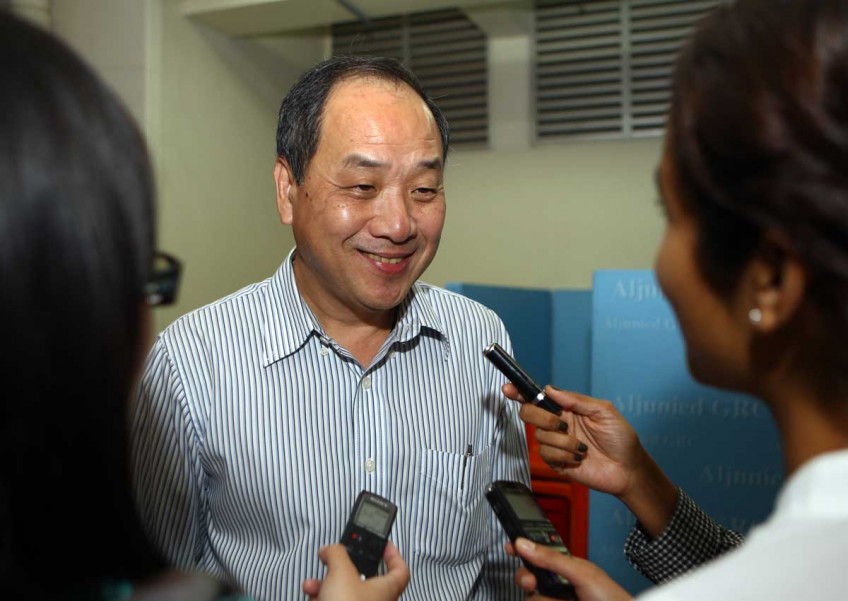Govt stays mum on GST hike; says no to independent Budget oversight office

The government remained coy on when the GST hike might be despite the best efforts of the opposition Workers' Party chief to pin it down in the Budget 2017 debate in Parliament on Tuesday.
It also shot down the suggestion of Low Thia Khiang, leader of the Workers' Party, that an independent Budget oversight office should be set up to analyse the Budget and assess the impact of its fiscal spending to make the government more accountable to citizens.
Mr Low said there is widespread speculation that the GST or goods and services tax, now at 7 per cent, will rise as part of the need to raise revenue to pay for more healthcare and infrastructure spending down the road. He would like to know if the GST hike would be "before the end of the decade" and by how much.
The government should be upfront with citizens so they will "not be blindsided" like the recent 30 per cent hike in water rates, he said.
Read also: Budget 2017's water price hike: What you're not hearing about the 30 per cent increase
The unexpected 30 per cent hike in water prices to be implemented in two phases from July was announced in last month's Budget.
Lawrence Wong, Second Minister for Finance, said the government has already said and he re-affirmed on Tuesday that it is studying all options to look at ways to raise revenue and there is no need to jump the gun on any of the options.
Singapore's GST system with permanent GST vouchers for the low income is how it maintains its progressive tax system where the rich pay more and the poor received more of the benefits, he said.
Read also: Singapore to raise water price by 30 per cent over two years
Indranee Rajah, Senior Minister of State for Finance, in reply to Mr Low's suggestion to set up an independent Office for Budget Responsiblity (OBR) like the UK has done, said it is important to look at the context.
"In determining whether to adopt institutions similar to those elsewhere, it is also important to understand the context in which those institutions were established," she said.
The OBR was set up in the UK in 2010. The new Conservative Liberal Democrat coalition government had just taken over from the Labour government after the general election and was burdened by a huge deficit inherited from the previous government, she said.
Read also: Water price hike necessary, but why now?
The then chancellor George Osborne, less than a week after taking office, said he was dealing with a fiscal crisis left by the last government. He said the budget deficit was the largest in UK's peacetime history and that year it was set to be among the largest in the world.
The UK urgently needed a full, independent assessment of how bad the problem really was as it needed to boost credibility and confidence in the UK's fiscal framework.
The OBR was set up to deal with huge deficits and unreliable budgeting, which is not the case in Singapore, Ms Indranee said. "Our government has a strong track record of sound finances.
"While many other countries are in a net debt position, we have consistently spent within our means and achieved a balanced budget in each successive term of government," she said. A good example is the Pioneer Generation Package, announced in Budget 2014 where S$8 billion was set aside from Current Reserves to help fund it.
The government consistently plans ahead and the current Budget is an example, she said. The finance minister has highlighted the longer term increases in healthcare and infrastructure needs and signalled that it will be reviewing revenue measures to meet this expenditure, she said.
Markets have full confidence in Singapore and it is among the few countries today that continue to enjoy triple A credit rating, she said.
Mr Low tried once more after Ms Indranee finished her speech. "Do we need to wait until financial markets lose confidence in us before setting it up?"
He also said it could provide useful input to the Elected President (EP) who does not have access to an independent body to analyse the Budget. The EP holds the second key to the reserves, and may veto the Budget if he is of the opinion that it is likely to draw on past reserves.
Ms Indranee said the correct approach to ensure that financial markets do not lose confidence in Singapore is never to get to that situation by maintaining fiscal prudence and discipline. Spend within your means and stay within your forecasts, she said.
As for the EP who is advised by the Council of Presidential Advisors, it does not preclude him from consulting other experts; it doesn't have to be an OBR, she said.

This article was first published on Mar 08, 2017.
Get The Business Times for more stories.